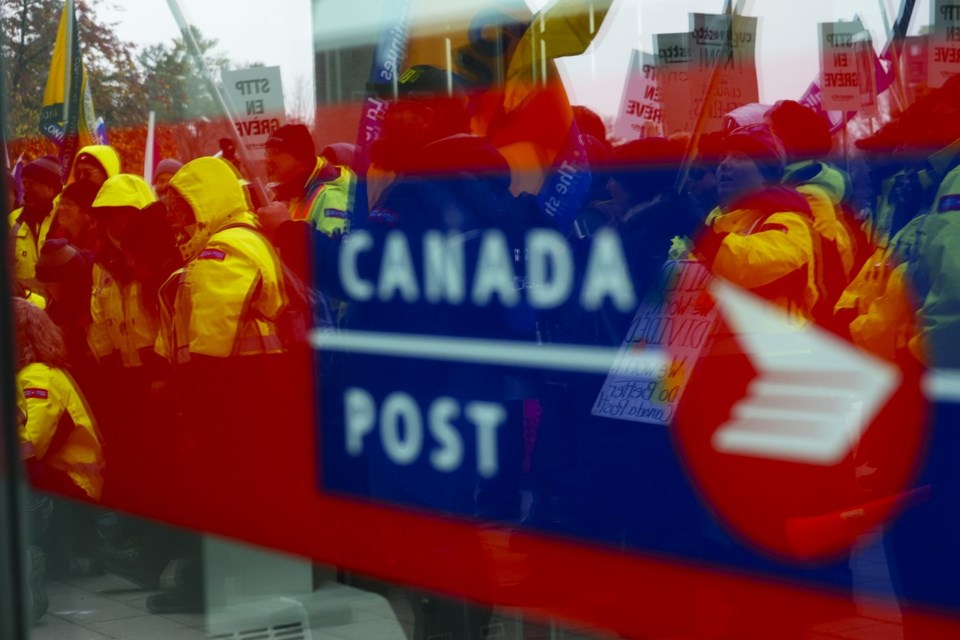OTTAWA — The union representing about 55,000 Canada Post employees has called for a countrywide halt to overtime work, saying its negotiators will continue to review the latest contract offers from the mail carrier.
The Canadian Union of Postal Workers said late Thursday that members were being told to refuse any work beyond eight hours in a day and 40 hours in a week.
Canada Post issued its own statement in response to the overtime ban, saying there are no rotating strikes or national work stoppages as of now, and postal operations will continue. However, the Crown corporation warned of possible delays.
The latest salvo in the long-running labour dispute came with CUPW set to be in a legal strike position as of Friday. It also came after a Thursday evening meeting between the two sides failed to lead to a deal.
"The meeting lasted less than half an hour with CUPW raising only a small number of the many outstanding issues in an informal manner," Canada Post spokeswoman Lisa Liu said in a statement. "It was unfortunately not enough to demonstrate meaningful progress."
Liu said Canada Post asked the union to come back, "with urgency," with a response to the offers the company presented earlier in the week.
The union had said the offers "fall short," noting workers are seeking a 19 per cent wage hike after years of rampant inflation.
Part-time weekend work has proved one of the biggest sticking points in the negotiations.
Under recent collective agreements, mail carriers must be paid extra for shifts on Saturdays and Sundays, which are relatively rare. Canada Post had pushed for a corps of part-time workers to be deployed as needed on weekends and during peak periods in response to rising parcel demand — rather than paying wages to full-time employees at overtime rates.
The union on Wednesday said management wanted to raise the number of part-time positions in urban areas by 20 per cent, claiming that some staff "would be forced to stay up to 30 hours per week."
Last week, a federally commissioned report proposed part-timers among a sheaf of drastic reforms. Calling Canada Post effectively "bankrupt," it suggested a pivot toward package delivery as well as rural post office closures and more community mailboxes — overhauls that would undo a long-standing moratorium on both and also go beyond the scope of collective bargaining.
The 162-page paper by arbitrator William Kaplan homed in on Canada Post’s flagging business model. Asserting that the company faces “an existential crisis,” he recommended ending daily door-to-door letter mail delivery for individual homes while maintaining it for businesses.
Kaplan also proposed dynamic routing and part-time positions with compensation comparable to full-time positions. He argued against the prospect of “gigified jobs” — freelance work at often fluctuating pay rates and no benefits.
On Wednesday, Canada Post rejected the union's call for a two-week "truce" that would have given workers time to review the latest offers in detail.
The union said it decided to proceed with an overtime ban to "minimize disruptions to the public and lost days to members."
"Additional actions may take place in the future," the union said.
If workers were to hit the picket lines, it would halt delivery of nearly 8.5 million letters and 1.1 million parcels per weekday, based on 2023 figures.
The disruption would deepen the company's growing financial hole. It notched an $803-million operating loss in the first nine months of 2024, part of $3.8 billion in losses since 2018.
The organization secured a $1.03-billion federal loan in January.
It would also be the second work stoppage in about six months.
A strike last year affected millions of residents, shippers and e-commerce retailers.
Overall, it resulted in an estimated $1.6 billion in losses for small businesses, according to the Canadian Federation of Independent Business.
This report by The Canadian Press was first published May 22, 2025.
The Canadian Press




